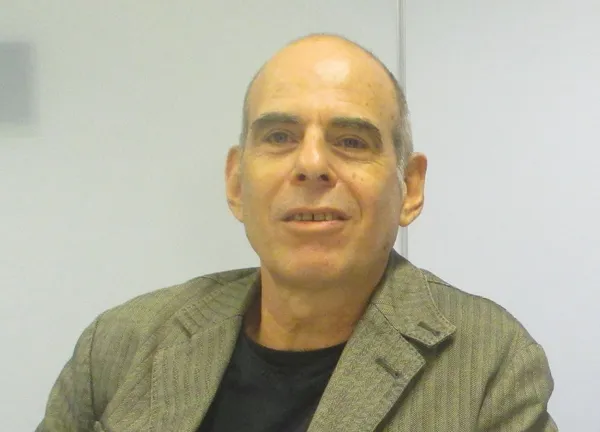 |
| Director/screenwriter Samuel Maoz on Foxtrot: "The hero is creating his own punishment. And fights against anyone who tries to save him." Photo: Anne-Katrin Titze |
Foxtrot, Silver Lion winner at the Venice Film Festival and Israel's shortlisted Oscar submission, begins with every parent's worst nightmare happening to the Feldmann family. We see a mother fainting because she knows that the Israeli military officers who have come to her home are here to inform them that their son Jonathan (Yonaton Shiray) had fallen in service.
The mother, Dafna (Sarah Adler) is given morphine to make her sleep, as we get to follow the father Michael's (Lior Ashkenazi) response to the devastating news. He descends into a private and national hell with fine subtleties of suffering and broad kicks of sadism. It is a marvelous, wickedly truthful performance because it balances so many emotions.
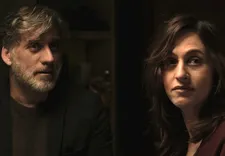 |
| Michael Feldmann (Lior Ashkenazi) with his wife Dafna (Sarah Adler): "His numbers are even. He can be four, six or eight. And she is odd." |
Samuel Maoz, whose last film Lebanon won the Golden Lion at the Venice Film Festival, teams up again with cinematographer Giora Bejach to produce a highly charged drama of man-made destiny that lets us feel the vast gaping void that opens up when one hears that a beloved person has died.
Foxtrot is a film about guilt. It is about family structures in present day Israel. It is about mourning, boredom and disconnect and ultimately tackles questions of complicity in the production of fate. Maoz seizes the heart and lets our brains catch up with the metaphors.
Anne-Katrin Titze: The foxtrot steps in a square are always coming back to the original place. The marking - I didn't even get that until we're talking now, that is also the marks on the arm, of course.
Samuel Maoz: This was for me more a social message than political. It's about the Israeli society, about this kind of look.
AKT: Mother and son communicate in two different languages. They do communicate that way, but the thing is, she doesn't know his [Michael's] name. She mistakes him with his brother [Avigdor]. There is the Cain and Abel, Lior brought up.
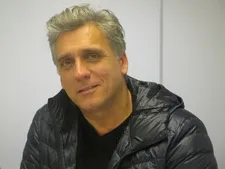 |
| On Lior Ashkenazi's Michael Feldmann in Foxtrot: "He is more sensitive to every element that takes his attention. He has to have things symmetrical." Photo: Anne-Katrin Titze |
SM: Lots of symbols, no? Symbols someone tells me, and I say, well, I need to use this in the next interview!
AKT: The visuals of the apartment, as beautiful as it is, it also feels a bit like time travel. There is something about it that makes it timeless, something that includes the past. Even more so, in the desert that station, that truck, those objects. I was thinking on the one hand, time standing still, the inertia of the real - we're forever stuck in the Fifties. How did you think about these objects?
SM: Yes, we thought about this as well. But also I'm not making naturalistic cinema. My cinema is more experiential, let's say. I'm trying to penetrate or reflect the souls of my characters. This is a kind of cinema where the visual dimension must be an integral part of the story. I told myself that one wide look at Michael's apartment should give us a lot of information about him.
I thought it should be very graphic, cold, very symmetrical. Because - how can I explain it? The first sentence that Michael says in the film, he said it with his back to the camera when he is far away. And what is the sentence? "I don't want people around me right now." So we have a combination between position of the actor, one sentence and the space. This frame should save us many pages of dialogue.
AKT: The apartment is very much his apartment. You don't feel it's the family's apartment.
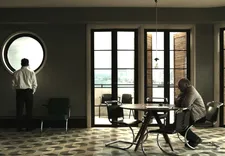 |
| Michael (Lior Ashkenazi) with his brother Avigdor (Yehuda Almagor) |
SM: Exactly.
AKT: The family has to fight to get in.
SM: In the third sequence, it's more hers [Dafna's].
AKT: Because we are in the kitchen?
SM: Not just the kitchen.
AKT: He is a man who cannot allow one little thing go wrong. Otherwise he is afraid everything falls apart.
SM: I felt it. I, for example, I can lie in the bed and watch television. And on the left side of me, someone threw a red T-shirt. So, I must take it out. My wife can't see it. Then I understood that someone who is peaceful somehow … So he needs to clean all those elements that …
AKT: … that disturb?
SM: He is more sensitive to every element that takes his attention. He has to have things symmetrical. His numbers are even. He can be four, six or eight. And she is odd. She can be three or eleven. Lior is eight, she is eleven.
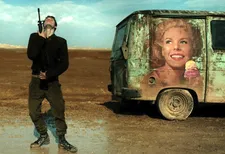 |
| On Jonathan Feldmann (Yonaton Shiray) in Foxtrot: "He painted the tattoo." |
AKT: I get it. Do you have synesthesia, by chance? Do you connect colours with letters, for example?
SM: No, but when I write, I try to give them numbers and also to give them colours.
AKT: Like Hockney and Nabokov. I have synesthesia - so I understand.
SM: Or for example to take an image and say, this is your dream, this is your nightmare. For example, when you open the door and see this image [the painting at the start of Foxtrot]. When I saw this image for the first time I thought to myself that I felt two things.
First of all I felt that this is a kind of organised chaos. This is the difference between casual coincidence and a coincidence that looks like a plan of fate, you know, when chaos is settled. The punishment corresponded with the sin - its exact form almost.
AKT: That's what he can live with?
SM: And also I felt, when I saw this image, this is like an X-ray of a soul of a post-traumatic guy. If I took an X-ray of his soul, that's what I'd get.
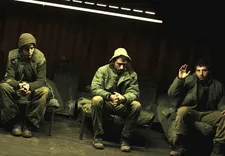 |
| Jonathan (Yonaton Shiray) raises his hand with his fellow soldiers |
AKT: And the son Jonathan has what looks like blood splatters over his drawings. Is that connected to his soul?
SM: You saw that one of the soldiers lying on a pillow has kind of that?
AKT: I noticed.
SM: We wanted to start to talk about Jonathan like he painted the blood on the pillow. He painted the tattoo. The tattoo came from the box of the weed. The siren. On the box the siren is full, on the neck the siren isn't because they cut the fishtail.
AKT: I didn't pick up on that.
SM: I didn't expect you to in the first screening. You saw a lot! You are complex. [He points to my notes for Foxtrot]. You are deep.
AKT: This is not my soul, though!
SM: No, no. I can learn a lot of you just from this.
AKT: Here I wrote - "Dance with gun - Gene Kelly with mop from Thousands Cheer [1943]". Followed by "the filthiest keyboard I have ever seen". That's another one of my notes.
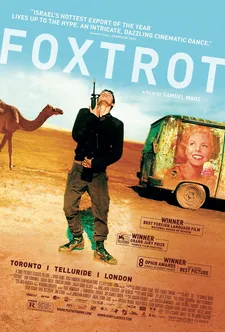 |
| Foxtrot US poster - film opens on March 2 |
SM: Because, you know, I have a keyboard like it. Now I stopped smoking, I allow myself just two or three cigarettes a day. But when I was smoking I'd find myself during my writing with four, five cigarettes, you know. I light one, then I light another one and then I forgot them on the keyboard. And I said, I won't change this keyboard until I finish the script.
AKT: Overall, the idea of fate and destiny - there are classic folktales, tales in the Grimms' collection such as Godfather Death and The Messengers Of Death where a man tries to escape his fate.
SM: It's a classic Greek tragedy.
AKT: Yes, classic tragedy combined with the tropes of folklore where a man can beat up the figure of Death he encounters at a crossroads.
SM: The hero is creating his own punishment. And fights against anyone who tries to save him. Nobody is obviously aware of what his action will bring about. And this is the difference I think between a casual coincidence and a spooky coincidence, a coincidence that looks like a plan of fate. This is the difference.
AKT: He is fighting for it?
SM: It's all punishment and everybody tries to save him. Nobody is aware of what he is doing but that's why it looks like a plan of fate.
Read what Lior Ashkenazi had to say on going to the edge of his emotions for Foxtrot.
Foxtrot opens in the US on March 2.





















